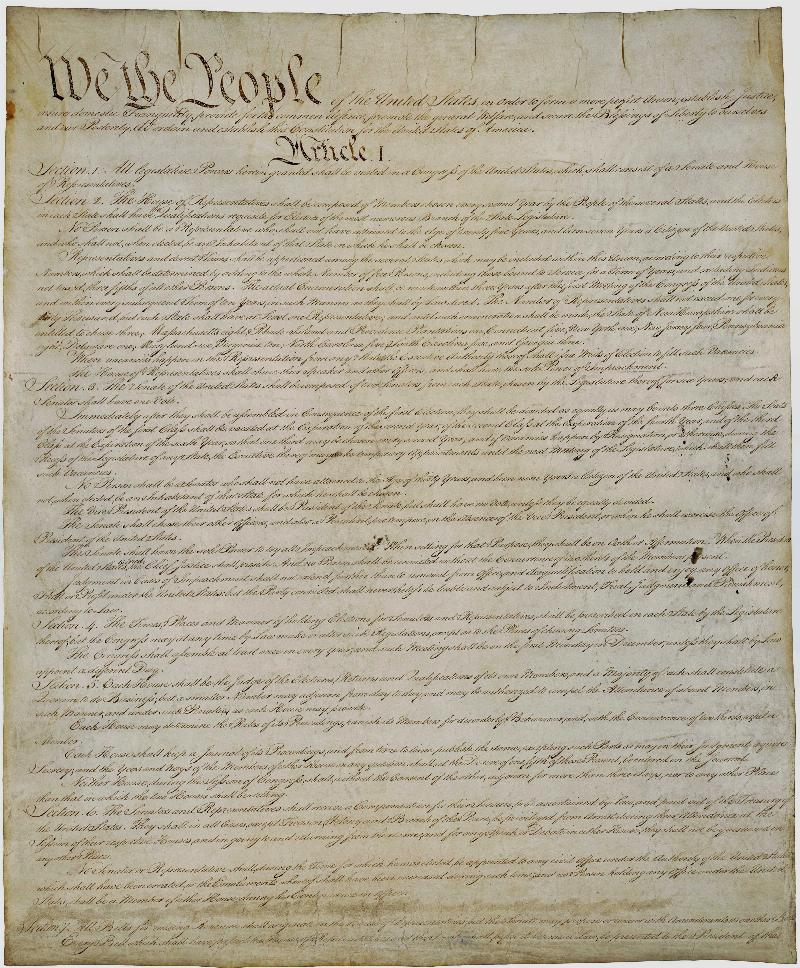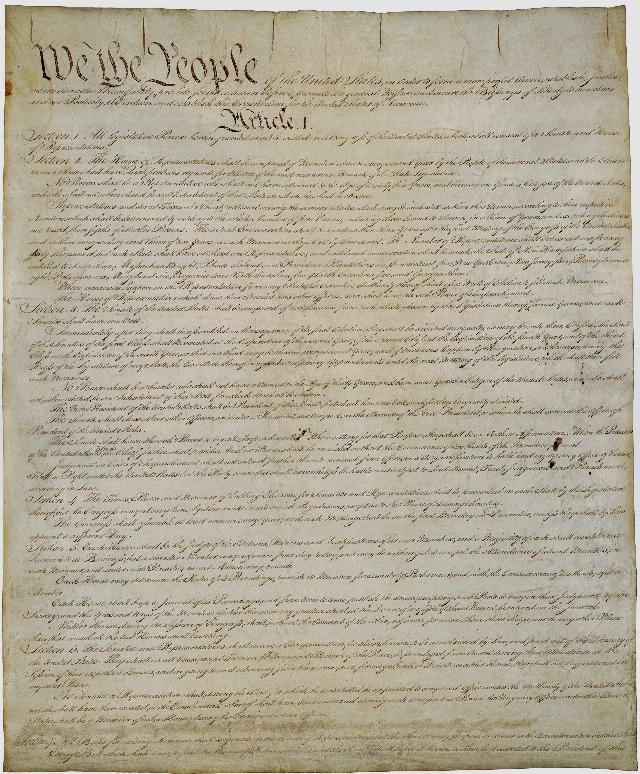


Conservatives often complain that God has been removed from schools and demand He be reinstalled. Amusing that anyone might imagine the Almighty must allow leftists to do anything or that He can’t defend Himself. God is omnipresent; He’s everywhere always.
It’s an issue with which I dealt as a teacher. Upon occasion, a parent would make that complaint and link it to the general downfall of America. It’s reasonable to believe America needs God. John Adams certainly did. In a letter to the Massachusetts Militia, he wrote:
Because We have no Government armed with Power capable of contending with human Passions unbridled by morality and Religion. Avarice, Ambition, Revenge or Gallantry, would break the strongest Cords of our Constitution as a Whale goes through a Net. Our Constitution was made only for a moral and religious people. It is wholly inadequate to the government of any other.

Graphic: US Constitution, National Archives, Public Domain.
There’s no doubt most American educators tend to the left. Even some that don’t aren’t fully aware of the law and the Constitution, and out of an overabundance of caution are sometimes overly restrictive of student’s First Amendment right to the free exercise of religion. Here’s what is lawfully proscribed in schools:
*Teachers can’t proselytize. They can’t advocate for religion or try to convert their students.
*Students can’t worship in disruptive ways. They can’t roll out their prayer rugs and begin to pray in math class, nor can they jump up in the middle of a class to call down the wrath of God on their evil English teacher.
*Teachers cannot mandate prayer or lead students in prayer. If they think that’s their job, they’re in the wrong profession.
Students can do pretty much everything else. They can certainly read the Bible or any other religious book as long as they’re not doing that instead of classwork. I maintained a small library in my classroom, which included at least four different versions of the Bible and multiple books on theology.
Schools can teach the Bible as literature, even history, but not as the one, true way. My Texas high school English Department offered an elective on the literature of the Bible. It never lacked for kids. In the mythology classes I taught, comparative theology was always a part. Teaching literature in general and American literature in particular, it’s essential to speak of the role of Christianity in the founding of Western Civilization and America. How can one understand the people of the past without knowing the beliefs that shaped them—and us? That’s true of any competent English or World History class, and it’s entirely lawful and appropriate, again so long as teachers don’t take the opportunity of a captive student audience to proselytize.
A young and sincere new teacher in my school thought the Spirit moved him to see his students as his religious mission. He also began to send proselytizing e-mails to the faculty. Our principal, a wise man, explained what I’m explaining in this article, and the new teacher wisely chose to teach rather than preach.
Students can also pray. As the old and accurate aphorism goes, so long as there is algebra, there will always be prayer in schools. Born without the math gene, I lived that aphorism.
How can a teacher tell what a student whose head is momentarily bowed and whose eyes are closed before class begins is praying? And even if they suspect they are, what harm does it do? I found my Christian students were generally more polite, attentive and serious about learning than others. I’m not suggesting one must be a practicing Christian to be a good, moral American, but like John Adams, I’ve no doubt it helps.
If a group of kids want to pray together at lunch, before or after school, or in the hallway between classes, that’s fine too. As Thomas Jefferson said, it neither picks my pocket nor breaks my leg.
Schools can also allow students space and time on school property, usually after school, for religiously themed meetings, though if a school has that policy, they may find themselves forced to allow meetings of Satanists and other groups parents might find disquieting.
Can the Ten Commandments be posted in schools? According to the Supreme Court, yes. However, it would be wise to ensure such displays genuinely serve a secular, educational purpose.
Despite what some would have us believe, God has never been removed from schools. Mankind doesn’t have that power, and the Constitution doesn’t demand it.
Become a subscriber and get our weekly, Friday newsletter with unique content from our editors. These essays alone are worth the cost of the subscription.
Mike McDaniel is a USAF veteran, classically trained musician, Japanese and European fencer, life-long athlete, firearm instructor, retired police officer and high school and college English teacher. He is a published author and blogger. His home blog is Stately McDaniel Manor.
